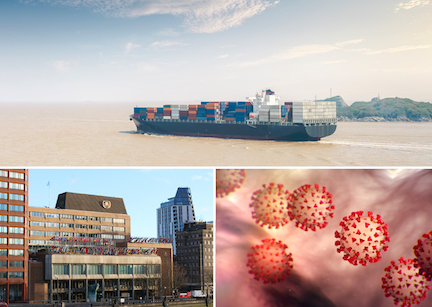The following is text of a news release from the International Maritime Organization (IMO):
(LONDON) — The need for crew changeovers to take place is of the utmost urgency, IMO Secretary-General Kitack Lim and shipping industry representatives agreed during a virtual IMO/industry meeting hosted by IMO on April 30.
Many seafarers on board ships (and personnel in the offshore industry) have been on enforced extended contracts during the COVID-19 pandemic, with restrictions on travel making it difficult for crew to leave ships and for new crew to join ships. These extended stays on board could have significant repercussions for crew well-being as well as for ship operations, several NGOs said.
Representatives of the International Chamber of Shipping (ICS) and the International Transport Workers' Federation (ITF) highlighted their work in leading a call for "hub" airports and seaports to be established, so that crew changes could take place more easily. Work is ongoing with governments, port authorities, health authorities and others to develop protocols for crew changes and crew movements. ICS said it estimated that 150,000 seafarers were trapped at sea and needed to change over as soon as possible.
Lim and industry representatives highlighted their appreciation for seafarers working on the front line to keep trade of essential goods flowing during the pandemic. They reiterated the need for seafarers, port workers and related personnel to be designated as key workers.
The meeting was updated on ongoing collaborative work underway to address specific issues during the pandemic. The IMO has been working with other United Nations agencies and bodies to issue joint guidance and statements, and to disseminate communications received from member states detailing their arrangements for issues such as certificate extensions. These are available on the IMO website.
The International Association of Classification Societies (IACS) highlighted the efforts of member surveyors to continue to certify ships for compliance with international treaty and class requirements, sometimes using techniques such as remote surveying where this was feasible. When surveyors do go on board, provision of personal protective equipment is critical.
There are legal questions over what happens when or if extensions of certificates need to go beyond the three months permitted extension in exceptional circumstances provided for under IMO treaties. The IMO secretariat noted that this issue was under active consideration.
NGOs were invited to submit their views and updates on survey and certification, seafarer changeover and other concerns, including the prioritization and rescheduling of IMO meetings to the forthcoming 32nd Extraordinary Session of the IMO Council, which is being held by correspondence from May to mid-July (see briefing).
Lim pledged to continue to collaborate and cooperate – including diplomatic consultations with member states – to tackle the challenges caused by the COVID-19 pandemic, in particular to address the issues faced by seafarers.
The virtual roundtable meeting was attended by Lim and IMO directors, and heads or representatives from the following NGOs in consultative status with IMO: BIMCO; Cruise Lines International Association (CLIA); International Association of Classification Societies (IACS): International Association of Ports and Harbours (IAPH); International Chamber of Shipping (ICS); International Federation of Shipmasters' Associations (IFSMA); International Marine Contractors Association (IMCA); International Association of Dry Cargo Shipowners (Intercargo; Interferry; International Association of Independent Tanker Owners (Intertanko); International Parcel Tanker Association (IPTA); International Transport Workers Federation (ITF); Oil Companies International Marine Forum (OCIMF); and the World Shipping Council (WSC).

